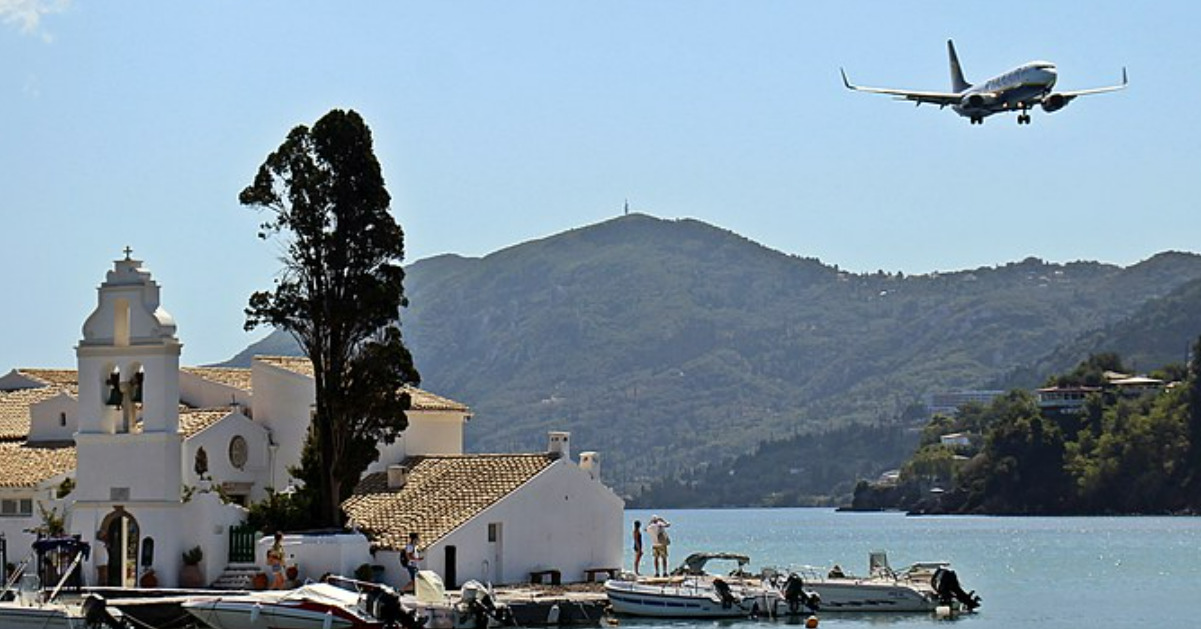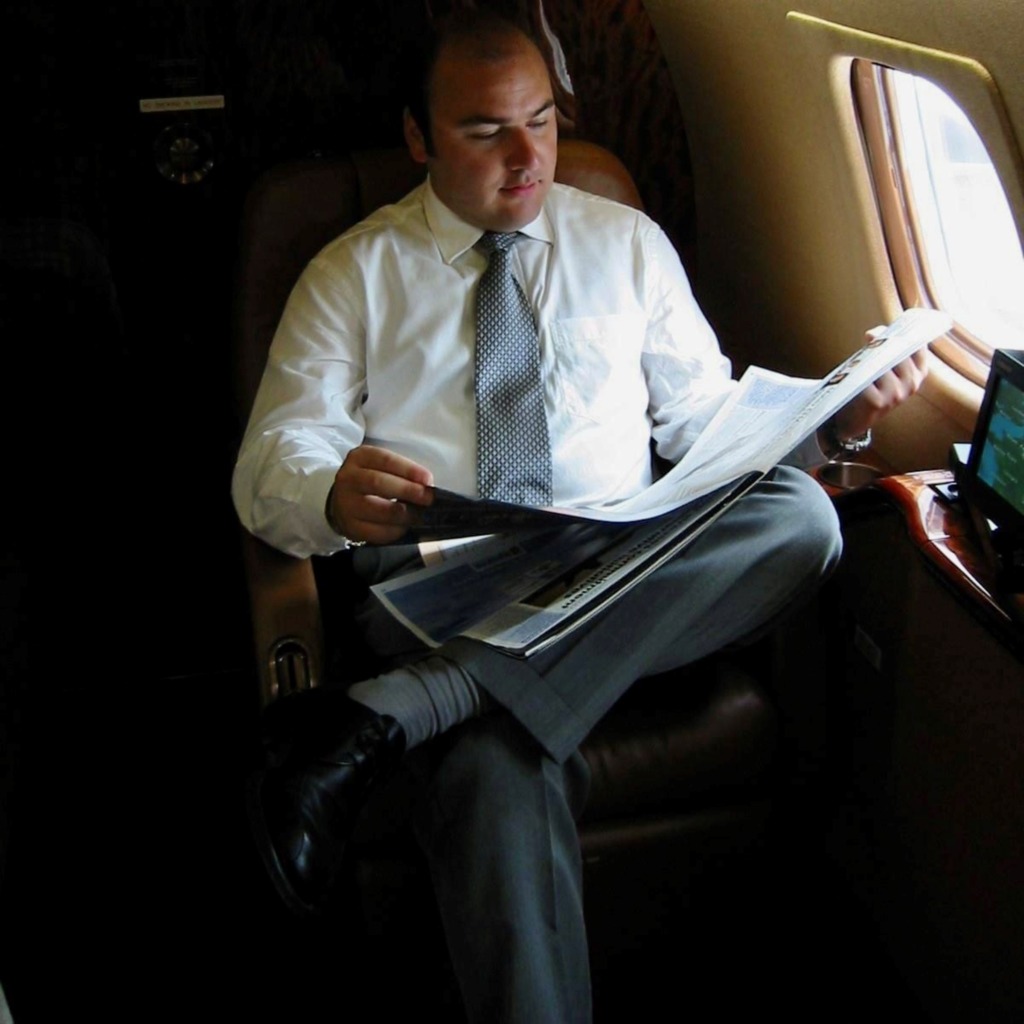Air Transport Management alumni stories: Marketing and Strategy Director Alex Karydis in Amsterdam
01/08/2022

Alex Karydis is a marketing and strategy director at Boeing in Amsterdam, The Netherlands. He graduated from Cranfield University with an MSc in Air Transport Management in 1998. Here, Alex talks about growing up by Corfu Airport; how Cranfield gave him a long-haul, international career ticket; and his fascinating career so far.
What sparked your interest in the air transport industry?
I was born near Corfu Airport, where the runway threshold was only a few hundred metres from my bedroom. Most people hated the frequent thundering noise of the aircraft engines, spooling up for a short runway takeoff. The flights ran at 100% passenger load factor, as they were virtually all leisure charter or low-cost flights originating from Northern Europe.
To my ears, the aircraft takeoff noise was a calling that elicited numerous questions that nobody in my family circle could completely answer or explain to me in detail. How is it possible for these heavy metallic constructions to take off and fly? What are the invisible forces that keep a heavy metallic structure in the air? Why do so many people all over the world leave their home every summer and come to spend a few weeks in Corfu instead? These were some of the burning questions I had as a teenager that I wanted to discover the answers to myself.
Why did you choose Cranfield?
Having just completed my first degree (BEng in Aerospace Engineering at Manchester University), I was finally able to visualise, understand, and even calculate all the invisible forces around an aircraft using computational fluid dynamics. I was able to visualise digitally and measure wing boundary layers in both subsonic and supersonic aircraft wings.
However, I still could not understand or explain some very basic questions about aircraft. How much does it cost to operate an aircraft? How is it possible for airlines selling tickets for only £9.99 GBP per seat to be able to be profitable? The answer to all my pending questions about the business operations of the air transport industry was Cranfield. Cranfield has always been the global leading college of aeronautics and, undoubtedly, I felt it would be able to help me answer all my questions regarding the business operations around an aircraft.
How did you find the course? What were the highlights?
Being an accomplished engineer that could spend hours and years calculating just a small part of the wing of an aircraft, the Air Transport Management MSc course at Cranfield opened for me the view to the whole world. After Cranfield, I got a bird’s eye view of the entire airline industry, and I could finally see the entire wood and not just a single tree. Cranfield and its big alumni network put me in touch with the industry OEMs, airlines, airports, and offered me several business choices different to engineering. In hindsight, Cranfield has been for me the best year of all my life and studies. This is why I keep returning to meet and talk with new students. I feel deeply that I owe everything I have professionally accomplished to date to Cranfield.
What has your career path been since graduating?
Cranfield certainly got me a long-haul, international career ticket. Since I graduated in 1998, I have had the honour and pleasure to work with engine and aircraft OEMs in every continent of the world: North America, South America, Europe, and Japan. Through my different career positions, not only have I learned new things and many foreign languages, but even more importantly I have discovered the different work and management cultures that very few textbooks are able to cover and properly address. I have been working in aviation for over 24 years – however, everything feels like it happened a few days ago. The moment you start feeling you have seen it and know it all then suddenly an industry crisis or geopolitical event happens, and it resets your knowledge. This is the greatest beauty of the air transport industry, in my opinion. It’s a vehicle for a long global journey, during which you get the opportunity to discover the entire world and ultimately yourself. I thank Cranfield for this long-haul, international career ticket offered to me every day of my life.

What does a typical week look like for you?
In aviation, a typical workday or week does not exist (at least this has been my personal experience so far). Every day offers a new challenge from the day before. However, in general, daily you will have to battle against different time zones, communication languages, work cultures and project deadlines. The air transport industry is not for the light-hearted. Travelling more than 50% of your time, including weekends far from your family, is something you have to accept and trade in for your life’s journey in this industry. On the other hand, you will hardly land to any place in the world or airport where you won’t have new friends waiting for you.
It has been a difficult time for the aviation industry. How have you been impacted professionally?
The recent global pandemic has caused unprecedented consequences and has tested at many levels our resilience as professionals in the air transport industry and as members of society. Like many others, I found myself unemployed and questioning if I should change industry. The answer didn’t take long to arrive, along with a new aviation job better than the one I had before. It’s true that the aviation business is a roller-coaster ride. However, if you are flexible to move places and open-minded, then you will always find a new seat with a new view.
What would you say to someone who wants to work in the air transport industry?
Someone said that the worst view of the world belongs to the one who has never seen it. I certainly believe in that as I have met a few people with such limited views. Cranfield and the air transport industry certainly helps minimise this sad phenomenon, opening up people’s eyes and giving them opportunities to discover our beautiful world. The human dream to fly higher, faster, and further will never be completely fulfilled. If one wishes to travel, meet, and work with people, and expand the limits of our current world, then the air transport industry is definitely the right environment for them to achieve that – and Cranfield University is the international departures terminal where they can get their ticket.
What do you think the future holds for the aviation industry?
During the past 25 years, I have personally experienced two airline industry catalyst events. The European Skies Liberalisation in Europe in 1996 with the advent of the first EU low-cost carriers, and the internet revolution and digitalisation of the industry in the early 2000s. Now the huge sustainability and flight to zero emissions challenge is in front of us. It going to take a lot of hard effort and years to achieve it, but it is definitely a noble cause to which everyone can contribute. New engineering disciplines and skills will be required in the industry to achieve that and therefore there will be new opportunities and career positions. The industry and regulatory authorities are all recruiting and preparing for the big sustainability goal challenge set for 2050 that will most probably come as a combination of sustainable green renewable energy sources (SAF), electrification and hydrogen use.
Is there anything else we should know about you?
Although I have a family and two kids, I still enjoy travelling. The world is big and there is still a lot to be discovered. My personal “Ithaca” is Corfu island, where I plan to return when I’m not airworthy anymore. However, like the Greek poet Kavafis advised all the travellers in his famous poem Ithaca, I also wish every day for myself and everyone else to have a long journey, full of adventure, full of discovery and to not be afraid of the challenges but enjoy it instead.
Categories & Tags:
Leave a comment on this post:
You might also like…
Keren Tuv: My Cranfield experience studying Renewable Energy
Hello, my name is Keren, I am from London, UK, and I am studying Renewable Energy MSc. My journey to discovering Cranfield University began when I first decided to return to academia to pursue ...
3D Metal Manufacturing in space: A look into the future
David Rico Sierra, Research Fellow in Additive Manufacturing, was recently involved in an exciting project to manufacture parts using 3D printers in space. Here he reflects on his time working with Airbus in Toulouse… ...
A Legacy of Courage: From India to Britain, Three Generations Find Their Home
My story begins with my grandfather, who plucked up the courage to travel aboard at the age of 22 and start a new life in the UK. I don’t think he would have thought that ...
Cranfield to JLR: mastering mechatronics for a dream career
My name is Jerin Tom, and in 2023 I graduated from Cranfield with an MSc in Automotive Mechatronics. Originally from India, I've always been fascinated by the world of automobiles. Why Cranfield and the ...
Bringing the vision of advanced air mobility closer to reality
Experts at Cranfield University led by Professor Antonios Tsourdos, Head of the Autonomous and Cyber-Physical Systems Centre, are part of the Air Mobility Ecosystem Consortium (AMEC), which aims to demonstrate the commercial and operational ...
Using grey literature in your research: A short guide
As you research and write your thesis, you might come across, or be looking for, ‘grey literature’. This is quite simply material that is either unpublished, or published but not in a commercial form. Types ...






